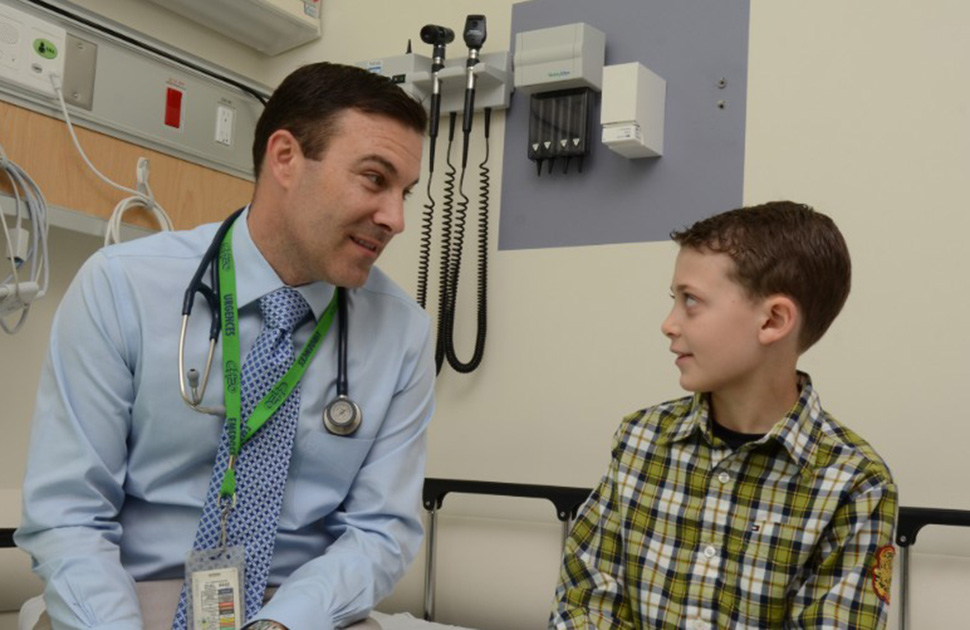Fetal Alcohol Spectrum Disorder (FASD) describes the range of effects that can occur in an individual exposed to alcohol before birth. These effects may include a wide variety of physical, intellectual, and neuro-behavioural deficits.
FASD Assessment Clinic
The CHEO FASD Assessment Clinic provides a multi-disciplinary diagnostic assessment for children, youth and adults with suspected FASD. The assessment team is comprised of a Social Worker, Psychologist, Psychometrist, Occupational Therapist, Speech Language Pathologist and Physicians.
Referrals
Eligibility Criteria for referrals:
- The individual must have confirmed or suspected exposure to alcohol before birth
- The individual must be 4 years of age or older - please note we will also accept referrals for adults
- The individual must have significant developmental, behavioural, and/or mental health concerns
- The individual must live within the Champlain LHIN (Ottawa, Renfrew County, Prescott and Russell, North Lanark/North Grenville and Stormont, Dundas & Glengarry)
- If a child protection agency or adoption agency was involved with the individual, all available records must be provided with the referral
A completed psychological assessment is no longer required prior to referral. Our team will complete this assessment if one has not already been done.
Referrals must be made by the legal guardian or by a physician. All referrals are made through the CHEO Access Team:
What to expect
Your first visit |
|
You will meet with a Social Worker. If the referral is for a child with suspected FASD, the parent/guardian can attend this visit without the child. The Social Worker will meet with you and gather all the information they can about the individual. The Social Worker will want to see:
|
Additional visits |
| Following your first visit, you/your child will be scheduled for all other required assessments. This may include visits with a Psychologist, Psychometrist, Occupational Therapist, Speech Language Pathologist and/or Physician. |
Reviewing your results |
| After the team completes their assessments they will meet and discuss the diagnostic outcome. You will then meet with the Social Worker and Psychologist to review the diagnosis. You will receive an individualized assessment report and recommendations. The Social Worker will help connect you to appropriate community resources including the FASD Worker program. |
Frequently asked questions
How is FASD diagnosed? |
|
We diagnose FASD by looking for these criteria:
|
Can FASD be diagnosed with a blood test or brain scan? |
| No. There are no reliable tests to tell us if a child’s brain development has been affected by contact with alcohol before birth. The doctor may recommend other tests, like a blood test, if they think your child’s difficulties might be caused by a genetic condition. |
How can use of alcohol during the pregnancy be confirmed? |
This can be difficult, especially if the child is adopted. Here are some possible ways:
It is best to have this information in writing, as hearing this information secondhand is not reliable evidence. Having reliable information is important so that the child doesn’t get misdiagnosed. |
My child was adopted from another country and I have no records about the pregnancy, birth, or their biological family. Can they still be diagnosed with FASD? |
| Only if they meet criteria #1 and have all 3 characteristic facial features. If they do not have the facial features, it doesn’t mean they were not exposed to alcohol, but we cannot make this diagnosis without confirming that the mother drank alcohol while pregnant. |
My child was checked for FASD in the past, and not diagnosed. Should they be checked again? |
| Generally speaking, no. But, if your child was very young at the time they were checked, it might be a good idea to reassess them. |
My child’s doctor referred them for an FASD assessment, but the referral was not accepted. Why did this happen? |
|
Possible reasons could be:
It is important we have all key information to help us figure out if your child meets the criteria for FASD. This will help you get the most out of your appointment. |
Where can I find resources and support?
| Ottawa and surrounding area |
The bilingual Fetal Alcohol Resource Program aims to support the large numbers of people affected by this permanent physical disability. Through education and community leadership development the program draws together resources, skills and knowledge that exists in Ottawa and provides clinical support and community navigation for individuals with FASD and their families. |
| Renfrew |
|
| Lanark Leeds Grenville |
|
|
Prescott–Russel |
|
| Stormont-Dundas and Glengarry |
|





